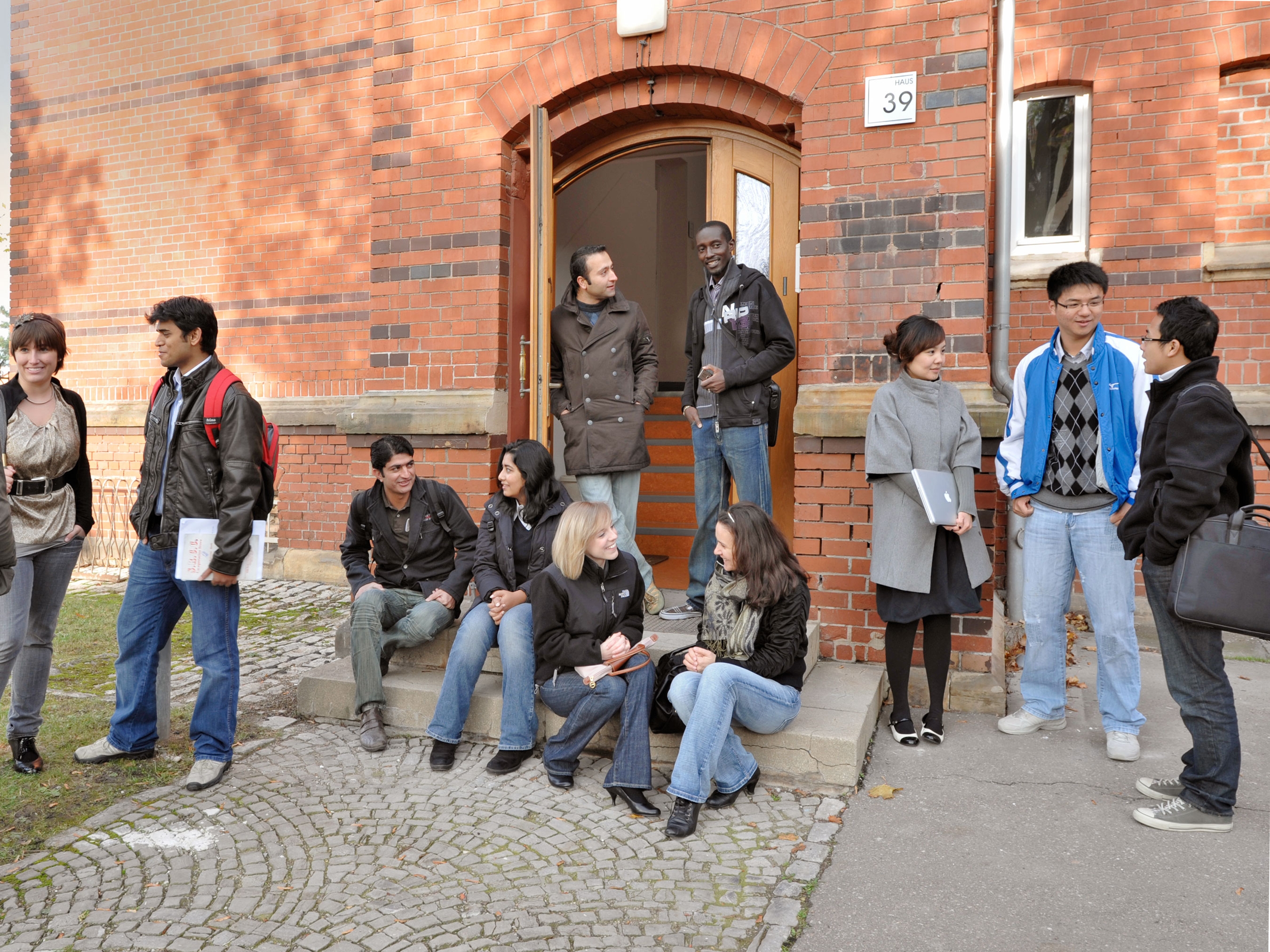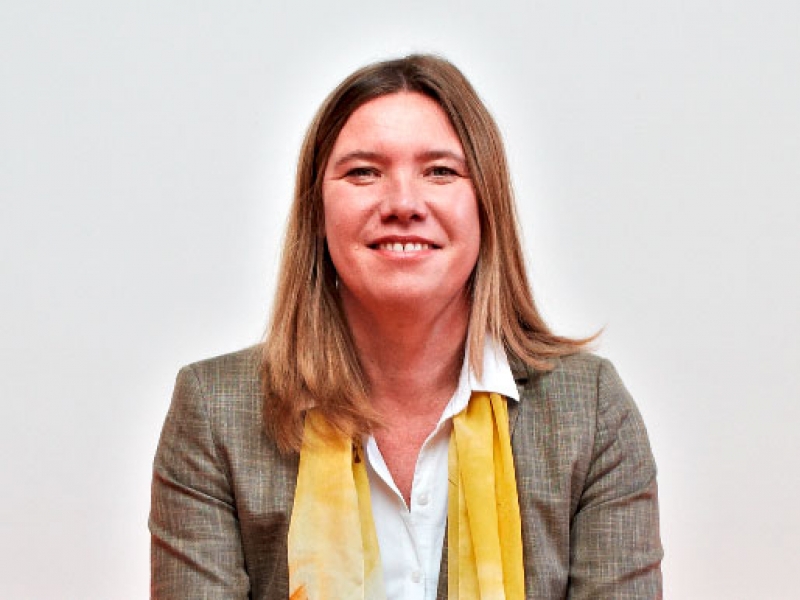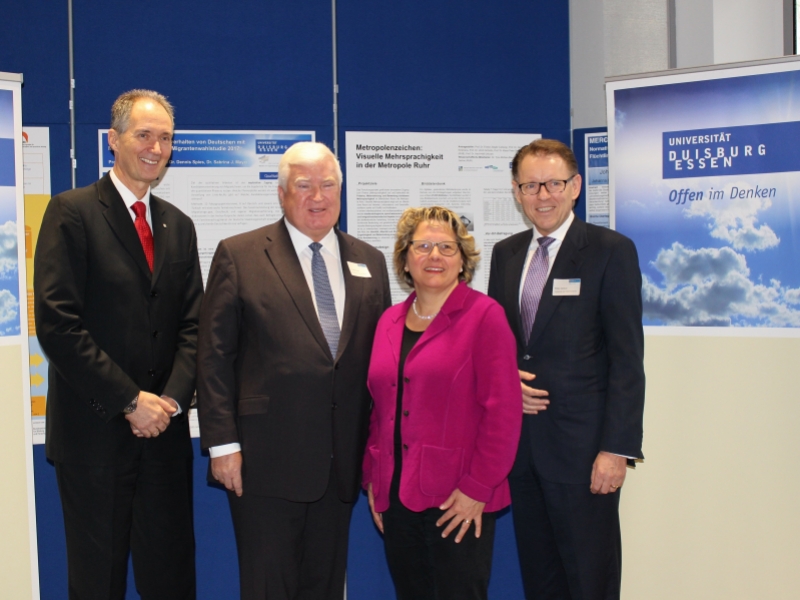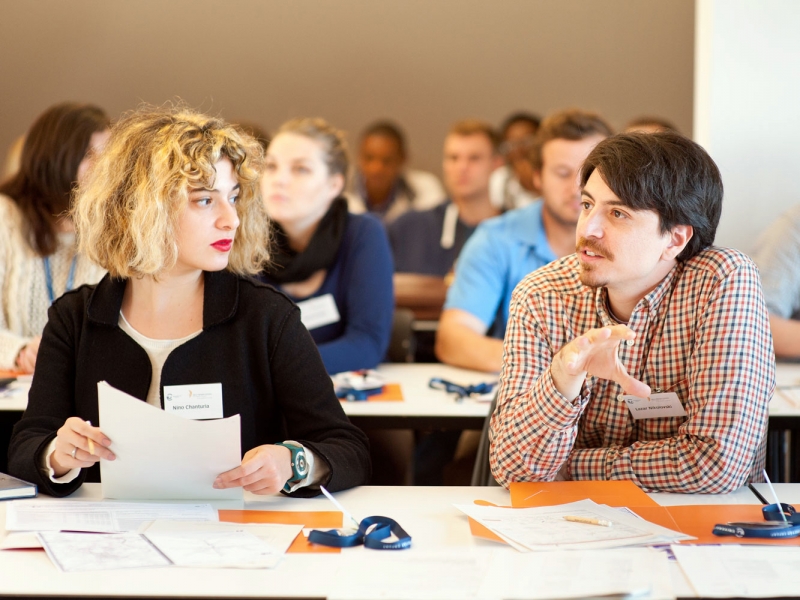
Willy Brandt School
An Erfurt success story
The Willy Brandt School of Public Policy – founded in 2002 as the Erfurt School of Public Policy and renamed in 2009 – was Germany’s first public institution to offer a two-year international post-graduate course of study in this subject. The English-language Master of Public Policy places students in a uniquely international and intercultural environment: in 2015, around 120 young people from more than 50 countries studied at the school.
Such a diverse setting offers the opportunity to experience and address the challenges and peculiarities of globalisation while still at university. Over the course of two years, students can specialise in European Public Policy, International Affairs, Public and Nonprofit Management, International Political Economy, or Conflict Studies and Management. The aim is to prepare students with international backgrounds to take on governmental and administrative roles, as well as for positions within non-government organisations in their respective home countries. Furthermore, the Brandt School has developed a unique research profile over the past few years: In addition to addressing issues of good governance, the school’s strategic and analytical expertise in conflict management in so-called fragile states has contributed to its excellent reputation among decision makers in the realms of politics and administration. What’s more, the research area of entrepreneurship has flourished: no longer merely defined by its significance for entrepreneurial and economic development, the study of entrepreneurship has also become known for its practical and methodological competencies, necessary for the promotion of progressive processes within both private and public organisations.
In a knowledge-based society, entrepreneurial, innovative, creative, and independent thought and action are crucial for comprehensive personal, organisational, and social development. As such, the focus on social entrepreneurship – both in terms of teaching and research – has been met with considerable success. Already, we have seen the implementation of social projects by students, as well as scientific awards for research papers, e.g. from the International Council for Small Business.
More than a decade’s worth of alumni statistics reveal the relevance of this course of study: a significant percentage of Brandt School graduates hold leading positions in public service and non-government organisations, with some working in the private sector. The following four graduates illustrate the variety of potential career paths the school has helped to produce:
KAILIMA KOMBWEY is a director of regional administration and national coordinator of the constitutional supervisory authority in the Tanzanian prime minister’s office. He completed his masters degree at the Willy Brandt School of Public Policy between 2009 and 2011.
HAMIDULLAH AFGHAN studied at the school between 2010 and 2012. Since 2015, he has served as the mayor of Jalalabad, one of Afghanistan’s largest cities, with a population of almost 100 000. The 29-year-old is the youngest mayor in the province of Nangarhar.
MIRELA VOLAJ studied at the school from 2006 to 2008, and is currently in Albania, working for Save The Children, one of the largest children’s charities in the world.
Haniel fellow EMILY MCCALLUM graduated in 2014 and is currently working as a »Knowledge Base Author« in the marketing department of sportswear giant Nike’s European headquarters.
»The best way to predict the future is to create it«, former German chancellor and Nobel peace prize laureate Willy Brandt once said. It is precisely this aim – creating the future – that we have in mind when addressing the definition and significance of public policy. The questions derived directly from this quote are:
- How can the future be created?
- How can local, national and global problems be analysed, addressed and solved?
- How can decision makers in politics be trained and supported?
Public policy tries to examine these »hows?«. The aim is to consult and inform governments and political decision makers using scientific insights, and to enable a decision that is ideally suited to the needs of all interest groups involved. An academic discipline striving to master this challenge and aiming to create consensus must inevitably build bridges between politics, administration, citizens, social groups and science (Lasswell 1951).
As early as the 1970, Thomas R. Dye explained that public policy is a form of governing that adheres to certain motives for action and brings about change (»What governments do, why they do it, and what difference it makes«). Dye stresses that public policy can mean refraining from action (Dye 1972, p. 2). A policy is a consciously made government decision, particularly when not only the proposed solution, but also the change affected by the policy, are of interest. (Howlett/Ramesh/Perl 2009, p. 4).
In order to summarise the nature of public policy, Peter DeLeon uses three keywords of Anglo-Saxon political science: Effective public policy must be problem-oriented, multi-disciplinary and value-oriented. (DeLeon 2006, p. 40f).
Probably the most popular method of scientific policy consultation is the policy cycle, developed by Lasswell (Lasswell 1956), which portrays the phases of formulating, implementing and evaluating policy as a timed, cyclical, and calculable process. In reality, this is not always the case. Phases often overlap during periods of political change and development, particularly the formulation and implementation phases. The policy cycle assumes that naming and addressing the problem forms the basis of any change envisaged by governmental action. There then follows the policy formulation of a proposed solution, prior to the actual decision making process. The term policy implementation describes the phase, as well as the form, of implementing a solution. In the final step, every policy must be evaluated in terms of the change it has brought about and on its effectiveness (policy evaluation).
Outside of real politics, the cycle seems to make sense. Taking into account the complexity of political-administrative
action in today’s more or less intertwined policy fields, such as education, migration, healthcare, employment or environment, the
challenges of modern policy consultation become obvious.
While, in the Anglo-Saxon world, public policy was developed and established in the middle of the last century, policy consultation in Germany developed in a state and administrationoriented fashion. Schuppert emphasised that administrative science is
concerned with relating different disciplinary approaches such as law, economics and business studies, political science, sociology, psychology, or state theory in order to enhance analytical competence (Schuppert 2003, p. 23). After the Second World War, the field of political science was re-established, modelling itself on its Anglo- Saxon equivalent. It did not use the state as the starting point of scientific research, but instead the concept of government. Thus, the scientific field of comparative government was established, addressing institutions and procedures of political rule and decisionmaking.
Wilhelm Hennis critically analysed this phase of reorientation in his 1965 treatise »Tasks for Modern Comparative Government«. For him, the main focus of political science was not on the system of government as an institutionalised order, but on governing itself and the analysis of governing techniques. He pointed to the questions which emphasised content (policies), as well as structures and processes. He formulated the aim of the new political science that was to look at structure and procedure as well as content: »What we need are medics, engineers, teachers, farmers and forest operators who are all able to think like political scientists. Vice versa, we urgently need political scientists who possess scientific knowledge of significant matters such as healthcare, infrastructure, defence, education, and who by virtue of their background in political science are able to view these matters as public tasks, i.e. in relation to governance techniques and political decision-making« (Hennis 1965, p. 413f). Hennis was thereby the first in Germany to formulate the agenda of a policy-oriented political and administrative science and, simultaneously, policy-oriented training for public service (Hennis 2000).
Administrative science, previously oriented alongside political science, shifted its focus from public administration, meaning organisational issues, to public policies, meaning issues of preconditions and consequences of political problem-solving and management. This focus on public policy and governance – in the broadest sense: management – is due to the fact that political and administrative procedures are increasingly seen as problem-solving processes, i.e. processes defined by the shaping of political institutions, by power acquisition and retention, and by administrative structures and perceptions (Mayntz/Scharpf 1995). Add to that the increasing complexity of processing social problems and the active creation of social circumstances, leading in return to the question of good governance. These topics went on to become increasingly important in political science (Benz 2003), which helps to explain the increasing demand for consultation in practice.
To conclude, let us once again highlight the significance of entrepreneurship as a force contributing not only to economic progress but also to social change as a whole. The policy entrepreneur is a type of actor who not only develops ideas for solutions to political and social challenges, but also designs measures and instruments for implementing and promoting change (Grimm 2010). Visionaries such as Schumpeter refer to personalities who »think the unthinkable« and sustainably initiate political as well as social transformation processes. In their book »Reinventing Government: How the Entrepreneurial Spirit is Transforming the Public Sector« (Osborne/Gaebler 1993), Osborne and Gaebler provide a large variety of examples of how entrepreneurship can overcome bureaucratic procrastination, as well as promote active citizenship and innovative action from state actors, resulting in the development of an efficient and effective bureaucracy which is subject to constant change and adapts to a rapidly changing globalised knowledge economy. The complexity and extent of political action taken by decision makers, as well as the demands they face, have increased drastically over the past two decades. This has come with the diversification and professionalisation of education and further training, owing to the increased demands in politics and administration, and helps to explain the rapid ascent of new academic courses in public policy and governance. Having built a solid foundation in its initial years, the Willy Brandt School of Public Policy can proudly count itself as one of the best institutions for training and consultation in public policy.
Benz, Arthur (2003): Politologische Verwaltungsforschung. In: Verwaltungswissenschaften und Verwaltungswissenschaft. Forschungssymposium anlässlich der Emeritierung von Klaus König, hrsg. von Jan Ziekow, Berlin: Duncker & Humblot (Schriftenreihe der Hochschule Speyer 159), S. 77–82.
Dye, Thomas R. (1972): Understanding Public Policy. Englewood Cliffs, New Jersey: Pearson Education.
Grimm, Heike (2010): Entrepreneur – Social Entrepreneur – Policy Entrepreneur. Typologische Merkmale und Perspektiven. In: Zeitschrift für Politikberatung, Jg. 3, H. 3–4, S. 441–456.
Hennis, Wilhelm (1965): Aufgaben einer modernen Regierungslehre. In: Politische Vierteljahresschrift, Heft 6, S. 422–441.
Hennis, Wilhelm (2000): Rat und Beratung im modernen Staat. In: Politikwissenschaft und Politisches Denken, hrsg. von Wilhelm Hennis, Tübingen: Mohr Siebeck, S.161–176.
Howlett, Michael / Ramesh, M. / Perl, Anthony (2009): Studying Public Policies. Policy Cycles and Policy Subsystems. Don Mills: Oxford University Press.
Lasswell, Harold Dwight (1951): The Policy Orientation. In: The Policy Sciences, hrsg. von Daniel Lerner und Harold Dwight Lasswell, Palo Alto, Kalifornien: Stanford University Press, S. 3–15.
Lasswell, Harold Dwight (1956): The Decision Process. Seven Categories of Functional Analysis. College Park: University of Maryland Press.
Mayntz, Renate / Scharpf. Fritz W. (1995): Gesellschaftliche Selbstregelung und politische Steuerung. Frankfurt am Main: Campus Verlag.
Osborne, David / Gaebler, Ted (1993): Reinventing Government: How the Entrepreneurial Spirit is Transforming the Public Sector. New York: Penguin Books.
Schuppert, Gunnar Folke (2003): Ist Verwaltungs(Staats)wissenschaft möglich? Überlegungen am Beispiel des Werkes von Klaus König. In: Verwaltungswissenschaften und Verwaltungswissenschaft. Forschungssymposium anlässlich der Emeritierung von Klaus König, hrsg. von Jan Ziekow, Berlin: Duncker & Humblot (Schriftenreihe der Hochschule Speyer 159), S. 15–41.

Prof. Dr Heike Grimm is Director of the »Willy Brandt School of Public Policy« and holder of the »Aletta Haniel Chair for Public Policy und Entrepreneurship«
Entrepreneurial thinking and application-oriented methods are vital to business, but they also propel social and political development in non-profit organisa- tions. Since 2002, the Willy Brandt School of Public Policy at the University of Erfurt has been conveying these competences in a two-year masters programme. Significant support comes from the Haniel Foundation which partly finances important professorships such as the »Franz Haniel Chair of Public Policy« (Prof. Dr Florian Hoffmann, since 2008) and the »Aletta Haniel Chair for Public Policy and Entrepreneurship« (Prof. Dr Heike Grimm, since 2013). Another chair, the »Gerhard Haniel Chair for Public Policy and International Development«, will follow in 2016. The three endowed chairs are making reference to the three key founding members of the Haniel company, representing the Haniel family’s future-oriented and entrepreneurial spirit. It is with great enthusiasm that the Willy Brandt School’s professors – Prof. Dr Heike Grimm, director, Prof. Dr Frank Ettrich (director 2009 – 2012) and Prof. Dr Florian Hoffmann (director 2012 – 2015) as well as founding director Prof. Dr Dietmar Herz and Jun. Prof. Dr Solveig Richter – train future leaders from more than 50 countries.





